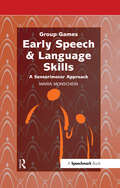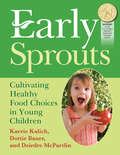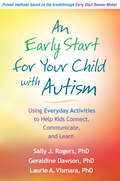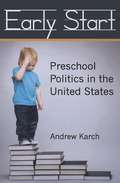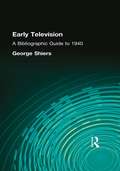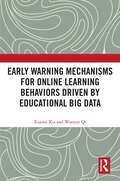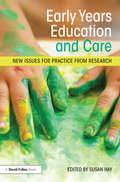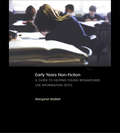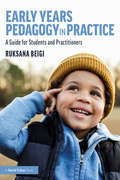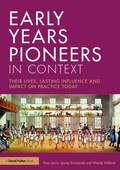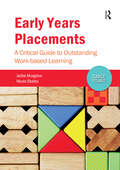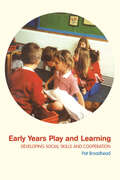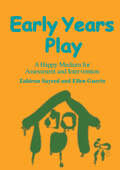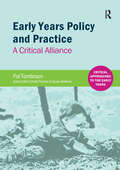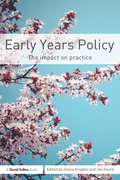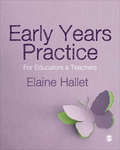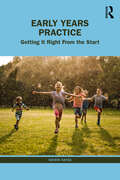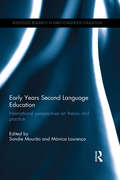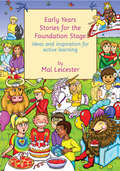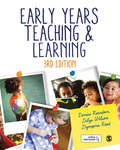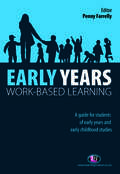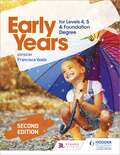- Table View
- List View
Early Speech & Language Skills: A Sensorimotor Approach (Group Games Ser.)
by Lilo Seelos Maria MonscheinFull of practical ideas that can be easily implemented with minimal preparation, this book contains a wealth of games and activities for developing language with young children. Following a multi-sensory approach, the games focus on having fun and working on speech language difficulties without having to concentrate directly on speaking. The games are organised around the school year and are themed according to which sense they specifically aim to develop. Most games can be carried out with little preparation, are easily adaptable and can be differentiated according to different children's abilities. Includes: Sense of touch games; Games for proprioception; Balancing games; Listening games; Games for developing hand-eye coordination and finger-motor skills; Games for promoting oral motor skills; Games for working on individual problematic speech sounds.
Early Sprouts
by Karrie Kalich Dottie Bauer Deirdre McpartlinTo counteract the prevalence of childhood obesity and to establish lifelong healthy eating habits, this research-based early childhood curriculum is designed to increase children's preferences for nutritious fruits and vegetables. The tested "seed-to-table" approach will engage preschoolers in all aspects of planting, growing, and eating organically grown foods. Also included are recipes children can help prepare and ways to involve the whole family in making healthy food choices. These activities can be tailored to fit any early childhood program, climate, or geographical region.
Early Start for Your Child with Autism
by Geraldine Dawson Sally J. RogersCutting-edge research reveals that parents can play a huge role in helping toddlers and preschoolers with autism spectrum disorders (ASD) connect with others and live up to their potential. This encouraging guide from the developers of a groundbreaking early intervention program provides doable, practical strategies you can use every day. Nearly all young kids-including those with ASD-have an amazing capacity to learn. Drs. Sally Rogers, Geraldine Dawson, and Laurie Vismara make it surprisingly simple to turn daily routines like breakfast or bath time into fun and rewarding learning experiences that target crucial developmental skills. Vivid examples illustrate proven techniques for promoting play, language, and engagement. Get an early start-and give your child the tools to explore and enjoy the world.
Early Start: Preschool Politics in the United States
by Andrew KarchIn the United States, preschool education is characterized by the dominance of a variegated private sector and patchy, uncoordinated oversight of the public sector. Tracing the history of the American debate over preschool education, Andrew Karch argues that the current state of decentralization and fragmentation is the consequence of a chain of reactions and counterreactions to policy decisions dating from the late 1960s and early 1970s, when preschool advocates did not achieve their vision for a comprehensive national program but did manage to foster initiatives at both the state and national levels. Over time, beneficiaries of these initiatives and officials with jurisdiction over preschool education have become ardent defenders of the status quo. Today, advocates of greater government involvement must take on a diverse and entrenched set of constituencies resistant to policy change. In his close analysis of the politics of preschool education, Karch demonstrates how to apply the concepts of policy feedback, critical junctures, and venue shopping to the study of social policy.
Early Television: A Bibliographic Guide to 1940
by George ShiersFirst Published in 1997. Routledge is an imprint of Taylor & Francis, an informa company.
Early Warning Mechanisms for Online Learning Behaviors Driven by Educational Big Data
by Xiaona Xia Wanxue QiThe book aims to design and construct early warning mechanisms based on the dynamic temporal tracking technology for online learning behaviors, driven by educational big data.By studying a massive amount of learning behavior instances generated in various interactive learning environments worldwide, the book explores the continuous sequences of correlated learning behaviors and characteristics. From various angles, the authors have devised a series of early warning measures that could effectively solve multiple issues in learning behaviors driven by educational big data. Additionally, the book predicts patterns and identifies risks by analyzing the temporal sequences of the entire learning process. While presenting a range of theoretical achievements and technical solutions to improve and design new online learning mode, it also provides relevant technical ideas and methodologies for research on similar problems.The book will attract scholars and students working on learning analytics and educational big data worldwide.
Early Years Education and Care: New issues for practice from research
by Susan HayWhat are the new benchmarks for the future in good early years’ provision? What should children and parents expect from practice given recent research evidence on how young children thrive? Developing and managing early years provision has changed significantly over the last few years. Parental expectations, policy creep, bureaucracy overload, inadequate training, a litigious climate, over-dependence on screens, traffic danger and child protection anxiety are among the many challenges now faced by early years providers. This timely new book explores the key issues faced by settings and what they mean for early years practice. Looking at the real evidence around children’s learning and wellbeing, parental preference and social trends, the book covers: Neuro-scientific research into the way children learn What parents know and expect Children’s wellbeing The indoor and outdoor environment Adult intervention The risk/benefit equation Nutrition, health and exercise Drawing on examples of outstanding practice from a wide range of settings, this exciting new book will help practitioners reach beyond what is expected and provide the very best for the children in their care.
Early Years Non-Fiction: A Guide to Helping Young Researchers Use and Enjoy Information Texts
by Margaret MallettThis lively and informative text examines children's first experience of non-fiction during the pre-school and foundation years. Its careful consideration of different kinds of quality non-fiction, including books, posters, charts and computer software will provide a helpful framework from which early years teachers can work. Annotated lists, notes, and suggestions for further reading make this is an ideal source of inspiration and stimulation placing literacy teaching in a fresh, modern context. This book offers a rich resource of information, with illustrated case studies and many examples of children's responses to non-fiction providing: coverage of pre-school and foundation years for children up to six years of age references to research findings on the place of non-fiction in early years references to the National Literacy Strategy, Early Learning Goals and the National Curriculum for English a substantial glossary of terms relevant to non-fiction reading and writing. The author's zest and expertise helps to give this book an infectious enthusiasm that will permeate the classroom, providing the nursery and primary school teacher, student teacher, or classroom assistant with an invaluable guide and resource tool.
Early Years Pedagogy in Practice: A Guide for Students and Practitioners
by Ruksana BeigiThis accessible text encourages readers to understand and confidently engage with distinctive early years pedagogy. It shows how pedagogy not only underpins the early years curriculum but is also inherent in the role of the adult and the experiences that are offered to young children. The book explains what the differing early years pedagogies are, why they are encouraged, and the knowledge, skills, and practice that are required to work with them. Emphasising that what works in one situation may not in another and a wider pedagogical knowledge is essential to ensure quality outcomes for children, it considers key topics such as: the role of the pedagogue and developing your own style promoting a lifelong love of learning in children under your care sensitivity and inclusion for all children’s cultures and communities promoting the rights of every child under your care. Incorporating reflection points and research tasks to support independent learning, this is essential reading for students on Early Childhood Studies courses and Early Years Foundation Degrees as well as early years practitioners.
Early Years Pioneers in Context: Their lives, lasting influence and impact on practice today
by Pam Jarvis Wendy Holland Louise SwiniarskiThis accessible text provides an international study of critical educational leaders who established the foundation for Early Childhood Education across continents in the 19th and early 20th centuries. It places each pioneer within the time and culture in which they lived to help the reader understand how theories and knowledge about early years education and care have evolved over time. Early Years Pioneers in Context traces key themes such as play, child-initiated learning, working with parents, scaffolding children’s learning and the environment, enabling students to reflect on the differences and similarities between the pioneers and understand their contribution to practice today. Pioneers covered include: Frederick Froebel; Elizabeth Peabody; Susan Blow; Rudolf Steiner; Margaret McMillan; Maria Montessori Susan Isaacs; Loris Malaguzzi. Featuring student integration tasks to help the reader link key ideas to their own practice, this will be essential reading for early years students on undergraduate and postgraduate degree courses.
Early Years Placements: A Critical Guide to Outstanding Work-based Learning (Early Years)
by Jackie Musgrave Nicola StobbsThis is a key text for all those undertaking placements or work-based learning (WBL) in early years settings. Taking a practical approach underpinned by theory and research, it guides student practitioners through their WBL to help them achieve an outstanding experience. There is a focus on the variety of child, parent and practitioner perspectives plus case studies involving the full range of ages from across the early years. While it is invaluable in answering key questions about placements it also encourages a reflective and critical approach throughout that develops and promotes professionalism. It is completely up to date with the latest Early Years Foundation Stage and includes reference to the Early Years Teachers' Standards.
Early Years Play and Learning: Developing Social Skills and Cooperation
by Pat BroadheadThis practical book provides an accessible framework for observing and assessing children's learning through play. It will help early years practitioners to deepen their understanding of the links between intellectual development, the growth of language and the emotional well-being of young children. Drawing on many years of research and working with teachers, Pat Broadhead has developed the Social Play Continuum, a unique observation tool and a means of monitoring and developing a child's social progress through skills such as problem-solving, investigation and imagination discourse. This tool forms an integral part of this innovative text, offering practitioners in a wide range of early years settings a means of focusing their observations of play. In addition, the book: supports the development of 'areas of provision' illustrates progression from 'association' to 'cooperative' play considers links with the Foundation Stage Curriculum, Profiling and the National Curriculum acknowledges the many constraints that have operated on early years practitioners in the past decade. Blending theory and practice this book is aimed at all early years' practitioners concerned with quality provision for their pupils. It is also the ideal text to support student teachers, classroom assistants and undergraduates on early childhood studies degrees.
Early Years Play: A Happy Medium for Assessment and Intervention
by Zahirun Sayeed Ellen GuerinFirst Published in 2000. Routledge is an imprint of Taylor & Francis, an informa company.
Early Years Policy and Practice: A Critical Alliance (Critical Approaches to the Early Years)
by Pat TomlinsonA comprehensive and up to date text for all those required to understand early years’ policy and practice. It provides a succinct insight into key elements of the national and international political, economic and social agendas that influence and affect young children’s lives, and the impact of these on early years’ professional practice and provision. It provides a critical examination of policy development and its application within an historical and international context.
Early Years Policy: The impact on practice
by Zenna Kingdon Jan GourdHow does early years policy impact on practitioners, children, settings and families? What are the implications of current policy for the future? How can early years professionals shape and craft practice in ways that genuinely focus on the needs of children and families, rather than the interests of policy makers? This exciting new text explores the changing context and increasing importance of early years policy. It takes a broad look at policy developments and shows how these have affected children, settings, parents and the early years workforce. Divided into two parts, the first examines theoretical perspectives and sets out the early years policy context, looking at issues surrounding accountability, international influences on policy and the Early Years Foundation Stage. The second half of the book directly shows how policy has influenced practice, and considers: the upskilling of the workforce and the impact of this on practitioners; the development of the learning environment including outdoor provision; sustained shared thinking and its link to high quality learning and teaching; the impact of policy on parents. Offering a fresh perspective on early years policy, this timely textbook will be essential reading for students on undergraduate and postgraduate Early Years and Childhood Studies courses and those working towards Early Years Teacher status.
Early Years Practice: For Educators and Teachers (Issues In Practice Ser.)
by Dr Elaine Hallet'I would recommend this book to students and trainees who wish to extend their knowledge and understanding of early years practice beyond level 3. This book is accessible, up to date and focuses on translating theory into practice, incorporating the essential higher order skill of reflection. The pedagogical foundations within place children firmly at the centre, whilst acknowledging the highly influential early years practitioner in the wider context of family, community and inclusive practice.' Sarah Barton, Senior Lecturer and EY ITT Programme Leader, School of Education and Continuing Studies, University of Portsmouth Are you studying to become an early years teacher or educator, or studying for an early years degree, and looking for a book to guide you through your qualification? With stories of practice, questions for reflection, further reading and links to the Teachers' Standards (Early Years), this book links professional practice with theory and research and will help you: · understand how children learn and develop · engage with the curriculum and the practice of teaching · learn more about the structure and reality of early years provision and practice for children aged from 0-8 years · develop ways to reflect upon your practice · develop professional skills and attributes needed to take a leading role · understand how to apply all of this to practice. This core textbook is ideal for students of early years and early childhood courses and will support you in your practice in the early years.
Early Years Practice: For Educators and Teachers (Issues In Practice Ser.)
by Dr Elaine Hallet‘I would recommend this book to students and trainees who wish to extend their knowledge and understanding of early years practice beyond level 3. This book is accessible, up to date and focuses on translating theory into practice, incorporating the essential higher order skill of reflection. The pedagogical foundations within place children firmly at the centre, whilst acknowledging the highly influential early years practitioner in the wider context of family, community and inclusive practice.’ Sarah Barton, Senior Lecturer and EY ITT Programme Leader, School of Education and Continuing Studies, University of Portsmouth Are you studying to become an early years teacher or educator, or studying for an early years degree, and looking for a book to guide you through your qualification? With stories of practice, questions for reflection, further reading and links to the Teachers’ Standards (Early Years), this book links professional practice with theory and research and will help you: · understand how children learn and develop · engage with the curriculum and the practice of teaching · learn more about the structure and reality of early years provision and practice for children aged from 0–8 years · develop ways to reflect upon your practice · develop professional skills and attributes needed to take a leading role · understand how to apply all of this to practice. This core textbook is ideal for students of early years and early childhood courses and will support you in your practice in the early years.
Early Years Practice: Getting It Right From the Start
by Nóirín HayesThis fully revised edition of Early Years Practice: Getting It Right From the Start integrates theory and practice and expands on the topics of early childhood practice as located within the context of international curriculum frameworks including Aistear, the Irish framework. With two new chapters it introduces readers to the complexities and possibilities of a play-based pedagogy and the importance of pedagogical leadership. Drawing on recent international scholarship, the book pays particular attention to the role of outdoor play and learning and the impact of digital technologies. It considers how best to manage the competing demands, challenges and tensions that affect the daily experiences of educators and children in contemporary society. This new edition also revises the original text with expanded references on topics such as the ecology of early childhood settings, education for sustainability, developmental psychology, education and neuroscience. This timely text also reviews international literature from both research and practice, strengthens understandings of the key role of relationships to quality practice and the effects on the development and learning of young children. All the chapters provide specific examples of good practice with strategies and suggestions aimed at enhancing the overall experience of early childhood settings for both educators and children. The information collected and explored in the book can be used by lecturers and educators alike to stimulate conversation, guide reflection and support the profession of early childhood educators to collectively work towards achieving, supporting and sustaining high-quality early years practice that adds constructively to the lives of babies and young children.
Early Years Second Language Education: International perspectives on theory and practice (Routledge Research in Early Childhood Education)
by Mónica Lourenço Sandie MourãoThe age for early language learning has dropped dramatically in the past decade to include children under 6 years old, yet very little published research exists to support the implementation of such programmes. Drawing on a synthesis of theory, research and practice, this edited volume makes an innovative contribution to literature concerning language education for very young children. It explores language learning in a wide range of geographical contexts with reference to second and foreign language learning, bilingualism and plurilingualism with children under the age of 6 years old. Chapters present discussion around teacher education, policy-making, international case studies, school and home-based projects, code switching and language use, and methodologies and approaches. Early Years Second Language Education: International perspectives on theory and practice will be essential reading for researchers, academics, teacher trainers, and post-graduate students in the fields of early years education, foreign and second language education, language didactics and teacher education.
Early Years Stories for the Foundation Stage: Ideas and Inspiration for Active Learning
by Mal LeicesterFollowing on from the success of Mal Leicester's previous books Stories for Classroom and Assembly and Stories for Inclusive Schools, this book shows how to make use of the learning power of story-time for young children, providing original, themed stories and associated learning activities to promote young children's cognitive and emotional development. Stories in this highly practical resource stimulate the child's interest and acts as a springboard to related learning games designed to develop children's skills in the six foundation areas of learning: personal, social and emotional development communication, language and literacy mathematical development knowledge and understanding of the world physical development creative development. Beautifully illustrated throughout, with extensive photocopiable material, this book recognizes the importance of play, games, social interaction, parental involvement, multicultural education and how to enjoy learning from an early age. All Early Years practitioners will find this book an essential addition to their bookshelves.
Early Years Teaching and Learning
by Denise Reardon Dilys Wilson Dympna Fox ReedCovering all routes to early years teaching, this textbook provides students and practitioners with everything they need to know to achieve their Early Years qualification. Previously titled Achieving Early Years Professional Status, this fantastic new edition is completely revised to include guidance and advice for those studying: Early Years Teacher Status Teach First Early Years Early Years Educator Early Years PGCE With new case studies illustrating best practice this text is also essential for professionals working in Early Years Education, Children’s Centres and local authorities. Journal articles linked to each chapter are available at https://study.sagepub.com/education
Early Years Teaching and Learning
by Denise Reardon Dilys Wilson Dympna Fox ReedCovering all routes to early years teaching, this textbook provides students and practitioners with everything they need to know to achieve their Early Years qualification. Previously titled Achieving Early Years Professional Status, this fantastic new edition is completely revised to include guidance and advice for those studying: Early Years Teacher Status Teach First Early Years Early Years Educator Early Years PGCE With new case studies illustrating best practice this text is also essential for professionals working in Early Years Education, Children’s Centres and local authorities. Journal articles linked to each chapter are available at https://study.sagepub.com/education
Early Years Work-Based Learning (Working with Children, Young People and Families LM Series)
by Penny FarrellyThis book supports students on foundation degrees and degrees in Early Years and Early Childhood Studies that have a work-based element. An essential introduction to becoming a professional in the sector, it begins by looking at work-based learning and goes on to cover study, research skills and essential subject knowledge. It includes activities to help students increase their confidence and get the most out of their course. Essential information on Early Years Professional Status (EYPS) considers the current scene and the future of the sector.
Early Years for Levels 4, 5 and Foundation Degree Second Edition
by Francisca VealeEngage learners with this new and fully updated edition that covers core topics across all aspects of Early Years.This comprehensive full-colour textbook will build knowledge and understanding, from traditional theory to cutting-edge research, and from updated legislative and regulatory frameworks, to effective practice examples. - Benefit from the expert knowledge of authoritative contributors, skilfully edited by Dr Francisca Veale.- Content carefully matched to core modules offered on higher level early years programmes.- New and relevant material covering literacy, numeracy and digital literacy.Who is this book for?Early Years for Levels 4 & 5 and the Foundation Degree is an authoritative and accessible course textbook for anyone studying at Levels 4 and 5, whether a Foundation Degree, HNC/HND, the first year of an undergraduate programme or other higher vocational qualifications related to early years or early childhood studies. It is also relevant to those working towards Early Years Professional Status (EYPS) or Early Years Teacher Status (EYTS).
Early Years for Levels 4, 5 and Foundation Degree Second Edition
by Francisca VealeEngage learners with this new and fully updated edition that covers core topics across all aspects of Early Years.This comprehensive full-colour textbook will build knowledge and understanding, from traditional theory to cutting-edge research, and from updated legislative and regulatory frameworks, to effective practice examples. - Benefit from the expert knowledge of authoritative contributors, skilfully edited by Dr Francisca Veale.- Content carefully matched to core modules offered on higher level early years programmes.- New and relevant material covering literacy, numeracy and digital literacy.Who is this book for?Early Years for Levels 4 & 5 and the Foundation Degree is an authoritative and accessible course textbook for anyone studying at Levels 4 and 5, whether a Foundation Degree, HNC/HND, the first year of an undergraduate programme or other higher vocational qualifications related to early years or early childhood studies. It is also relevant to those working towards Early Years Professional Status (EYPS) or Early Years Teacher Status (EYTS).
